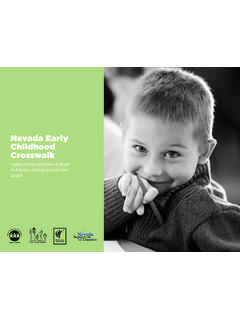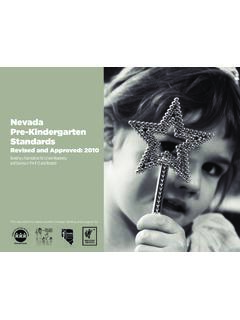Transcription of Nevada Pre-Kindergarten Standards
1 Nevada Pre-Kindergarten Standards Revised and Approved: 2010. Building a Foundation for School Readiness and Success in Pre K-12 and Beyond This document is made possible through funding and support by Nevada State Board of Education Nevada State Board for Career and Technical Education Christopher Wallace, President Dr. Cliff Ferry, Vice President Gloria Bonaventura Willia Chaney Craig Wilkinson Sandy Metcalf Annie Yvette Wilson Adriana Fralick Dave Cook, Clerk Zhan Okuda-Lim, Ex Officio Stavan Corbett Keith Rheault Superintendent of Public Instruction Gloria Dopf, Deputy Superintendent Instructional Research and Evaluation Services Greg Weyland, Deputy Superintendent Fiscal and Administrative Services Rorie Fitzpatrick, Director Office of Special Education, Elementary and Secondary Education, and School Improvement Programs Nevada Department of Education Office of Special Education, Elementary and Secondary Education, and School Improvement Programs 700 East Fifth Street, Suite 113.
2 Carson City, NV 89701-5096. (775) 687-9171 Fax (775) 687-9250. The State of Nevada is an equal opportunity employer and does not discriminate or deny services on the basis of race, color, national origin, sex, disability, and/or age. 1. TABLE OF CONTENTS. Acknowledgements .. 3. Thanks and Recognition .. 4. List of Acronyms .. 5. Nevada Pre-K Content Standards Introduction .. 6. Purpose of the Pre-K Standards .. 6. History of the Nevada Pre-K Standards .. 8. Guiding Principles .. 9. Pre-K Content Standards Format .. 11. Common Core Standards .. 12. Nevada 's Early Childhood Comprehensive System .. 13. Professional Development System .. 15. Inclusive Learning Environments in Pre-K Programs .. 16. Culture, Diversity and 18. What is High Quality Pre-K? .. 18. School Readiness .. 19. Key to Standards Identification and Cross Referencing Links .. 20. Early Learning Guidelines and Pre-K Standards Alignment Crosswalk .. 21. Mathematics .. 22. Science.
3 27. Language and Early Literacy .. 32. Social Studies / Social Emotional .. 42. Approaches to Learning: Creative Expression .. 52. Physical Development and Health .. 67. Nevada K-12 Content and Common Core Standards .. 77. Glossary .. 82. Appendix .. 87. References .. 100. 2. ACKNOWLEDGEMENTS. The Nevada Department of Education would like to thank the Nevada Pre-K Content Standards Revision Committee for their hard work and contribution to this document. The revised document has been designed to be a useful tool to help teachers with planning and implementing the Standards into their curriculum. This document is also developed for parents. Material from the original parent and teacher guidebooks has been included in this document. Some of the original writing team members contributed to this revised version. 2010 Pre-K Content Standards Revision Committee Kathlene Banak*, Clark County School District Cindy Johnson, State of Nevada - Office of Early Care and Education Dr.
4 Cheryl Brecheisen, College of Southern Nevada Shelly Nye*, The Nevada Registry Dr. Melissa Burnham, University Of Nevada , Reno Dawna Ogden, Washoe County School District Margot Chappel, Head Start Collaboration Connie Poulton*, Nevada Department of Education Cindy Duarte, Clark County School District Peggy Pulver*, Washoe County School District Dr. Joanne Everts*, Washoe County School District Sue Turbow, Truckee Meadows Community College Tracy Gruber*, Nevada Department of Education Anna Severens*, Nevada Department of Education Sherry Halley*, Nevada Department of Education Tina Schennum Springmeyer*, Nevada Pre-K Standards Stephanie Hartman*, Nevada Department of Education Crystal Swank, Truckee Meadows Community College Lori Magnante, Western Nevada Community College Richard Vineyard*, Nevada Department of Education Lynette Macfarlan, Great Basin College Primary Authors Tina Springmeyer, Nevada Pre-K Standards Program Anna Severens, Nevada Department of Education Editor Terry Randolph, Washoe County School District * Writing Team Participant 3.
5 We would like to thank and recognize the Nevada Pre-K Content Standards 2004. Original Writing Committee: Keith Allred, Nevada Department of Education Diane Nicolet, Truckee Meadows Community College Child Care Center Rita Hemmert, Washoe County School District Mary Eldridge, Little People's Head Start Mara Anderson, Kids Klub Preschool Rebecca Noveroske, The Child Garden Joelene Holmes, Calvary Baptist Church Preschool Eva Essa, University of Nevada , Reno Nancy Kay Arnold, Cottonwood Elementary School Peggy Pulver, Washoe County School District Pat Hunter, McCaw Elementary School Joanne Everts, Washoe County School District Gilda Austin, Clark County School District Cheryl Rowe, Community College of Southern Nevada Cindy Johnson, State of Nevada - Office of Early Care and Education Stacey Francois, Washoe Tribe of Nevada and California Head Start Kathy Biagi, Head Start State Collaboration Paulette Scott, Economic Opportunity Board Debby LaRocca, Clark County School District Diane Hardy, Classroom on Wheels Diane Branson.
6 Special Children's Clinic Cindy Sharp, Nevada Department of Education Janie Lowe, Nevada Department of Education Paula Hawkins, Bureau of Services for Child Care James Brandt, Nevada Department of Education Barbara Sloan, Jacks Valley Elementary School Lori Magnante, Western Nevada Community College Crystal Swank, University of Nevada , Reno & Cooperative Extension Meg Burns, Lyon County School District Lynn Turner, Clark County School District Sally Martin, University of Nevada , Reno Cooperative Extension Laurel Swetnam, Southern Regional Early Childhood Services Karen Dickinson, Up and Away Learning Center Mary Tyler, Pershing County School District Christine Matiash, State of Nevada - Office of Early Care and Education Joan Taylor, Nevada Department of Education Cindy Duarte, Clark County School District Sherry Waugh, University of Nevada , Reno THANK YOU. Diane Neese, Clark County School District Sue Turbow, Truckee Meadows Community College Leanna Dyer, CSA Head Start Dan Weigel, University of Nevada , Reno Cooperative Extension 4.
7 List of Acronyms ARRA American Reinvestment and Recovery Act IRA International Reading Association CCDF Child Care and Development Fund K-12 Kindergarten through 12th Grade CCSSO Council of Chief State School Officers NAEYC National Association for the Education of Young Children CKA Core Knowledge Areas NASPE National Association for Sports and Physical Education CNAEA Consortium of National Arts Education Associations NCTM National Council of Teachers of Mathematics CSN College of Southern Nevada NDE Nevada Department of Education DEC Division for Early Childhood NECTAC National Early Childhood Technical Assistance Center DHHS Department of Health and Human Services NevAEYC Nevada Association for the Education of Young Children ECAC Early Childhood Advisory Council NGA National Governors Association ECCS Early Childhood Comprehensive System NRC National Research Council ECE Early Care and Education NIEER National Institute for Early Education Research ELA Early Literacy Activities Pre-K Pre-Kindergarten ELG Early Learning Goals QRIS Quality Rating and Improvement System GBC Great Basin College TMCC Truckee Meadows Community College ICC Interagency Coordinating Council UNLV University of Nevada , Las Vegas IDEA Individuals with Disabilities Education Act UNR University of Nevada , Reno IEP Individualized Educational Program WCSD Washoe County School District IM Institute of Medicine WNC Western Nevada College 5.
8 Nevada Pre-Kindergarten Content Standards Introduction Welcome to the 2010 revised edition of the Nevada Pre-Kindergarten (Pre-K) Content Standards , which provides the framework for curriculum and instruction in all of Nevada 's Pre-K classrooms. The revised Standards include the A child's most important content Standards as well as resources and materials that were previously printed in the teacher and family guidebooks. The content Standards are used for planning curriculum, assessing growth and development, and for sharing important brain development occurs information with families. This document is a joint effort supported by the Nevada Department of Education's (NDE) before age 5.. Office of Special Education, Elementary and Secondary Education, and School Improvement Programs, aligning with the Nevada K-12 Content Standards , as well as the Nevada Department of Health and Human Services (DHHS) and the Child ~Pre-K Now Care and Development Fund (CCDF).
9 Recent information about children's development and learning underscores the importance of high-quality early education and care. Research has revealed overwhelming evidence that young children are learning from their earliest months and years. We know that high-quality educational experiences have a positive impact on learning in later years. In addition, research has shown that young children who live in circumstances that increase their risk of school failure are much more likely to be successful in school if they participate in high-quality early learning programs. As the nation looks to its future in a global society, especially to its need for an educated and skilled workforce, economists have also calculated the benefits of increased investments in early education. Their findings show a greater likelihood that young people will become economic and social contributors to society; that federal, state, and local governments will be able to reduce investments in remediation, incarceration, and welfare; and that a better-educated workforce will be able to support the nation's continuing economic growth (PreKNow 2009).
10 Purpose of the Pre-Kindergarten Standards The Nevada Pre-K Standards describe appropriate outcomes for children at the end of their preschool experiences and entering kindergarten. Therefore, when reading the Standards one should think in terms of the child's final learning outcome before entering kindergarten. The Standards are guidelines to be used with all children in any early education setting, such as childcare centers, family childcare homes, Head Start, preschools and school district Pre-K programs. As the importance of early childhood education continues to grow, new initiatives and research are recognizing Pre-Kindergarten as a foundation of school success. This paradigm shift can be seen by the following recent collaborations and focus on early childhood. The current administration, US Department of Education and US Department of Health and Human Services have a new level of collaboration with an unprecedented level of attention on early childhood.





